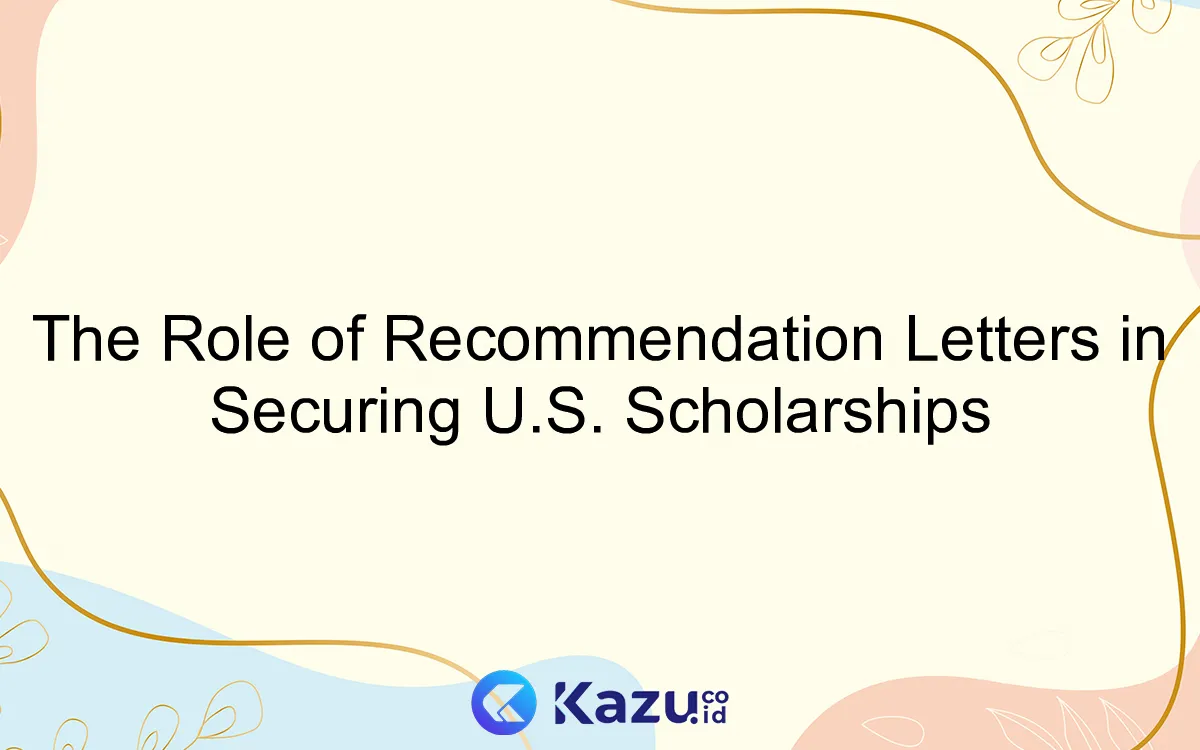The Importance of Strong Recommendation Letters
When it comes to securing U.S. scholarships, recommendation letters play a crucial role. These letters, written by individuals who can vouch for your abilities and character, provide a valuable insight into your qualifications as a candidate.
One of the main reasons why recommendation letters are so important is that they provide an unbiased evaluation of your skills and achievements. Admissions committees and scholarship panels rely on these letters to gather additional information beyond what is presented in your application. A strong recommendation letter can highlight your unique strengths and demonstrate your potential for success.
Moreover, recommendation letters serve as a testament to your personal qualities, work ethic, and integrity. They provide evidence of your commitment, determination, and interpersonal skills. By showcasing your character and highlighting your positive attributes, these letters can greatly enhance your chances of securing scholarships.
Additionally, recommendation letters offer valuable insights into your academic abilities and potential. Professors, mentors, and supervisors who have worked closely with you are able to provide specific examples of your academic achievements and potential for growth. This helps scholarship committees determine whether you are a deserving candidate who would excel in a U.S. educational environment.
In conclusion, strong recommendation letters can significantly impact your chances of securing U.S. scholarships. These letters provide a comprehensive overview of your abilities, character, and potential, giving admissions committees and scholarship panels a deeper understanding of your qualifications as a candidate. Therefore, it is crucial to carefully select individuals who can provide an accurate and compelling portrayal of your qualifications when requesting recommendation letters.
What Makes a Recommendation Letter Stand Out?

A recommendation letter plays a crucial role in securing U.S. scholarships. It provides insights into an applicant’s character, abilities, and potential. To make a recommendation letter stand out, several key elements should be included:
-
Affiliations and Credentials:
The recommender’s affiliation with the applicant and their relevant credentials give weight to the letter. Mentioning professional titles, educational background, and accomplishments can strengthen the letter’s credibility.
-
Specific Examples:
Including specific instances that highlight the applicant’s qualities can make the letter more compelling. Describing their achievements, experiences, or character traits with concrete examples provides evidence of their skills.
-
Personalization:
Tailoring the letter to the scholarship or institution demonstrates the recommender’s commitment. Highlighting how the applicant’s strengths align with the scholarship’s goals or the institution’s values shows a genuine understanding of the opportunity.
-
Honesty and Detail:
A strong recommendation letter provides an honest and detailed assessment of the applicant. It should include information about their academic performance, leadership abilities, extracurricular involvement, and any other relevant qualities that make them an exceptional candidate.
-
Comparative Analysis:
Drawing comparisons with other candidates can give a clearer perspective on the applicant’s strengths and unique contributions. It can also help scholarship panels differentiate the applicant from a pool of highly qualified individuals.
-
Positive Tone:
Using a positive and enthusiastic tone throughout the letter helps portray the applicant in the best light. Expressing genuine admiration and support for the applicant can leave a lasting impression on the scholarship selection committee.
By focusing on these elements, a recommendation letter can stand out among others and significantly enhance the applicant’s chances of securing U.S. scholarships.
Tips for Requesting and Obtaining Effective Recommendation Letters
When applying for U.S. scholarships, recommendation letters play a crucial role in validating your qualifications and potential. Here are some tips to help you request and obtain effective recommendation letters:
-
Choose the Right Recommenders
Select individuals who can speak to your abilities, accomplishments, and character. Professors, supervisors, or mentors who have worked closely with you are ideal candidates.
-
Provide Relevant Information
Supply your recommenders with necessary details such as your academic achievements, extracurricular involvement, and career goals. This information will assist them in writing a personalized and compelling letter.
-
Ask Politely and Well in Advance
Approach your potential recommenders professionally and respectfully. Request their assistance well ahead of the application deadline to allow them sufficient time to craft a thoughtful letter.
-
Discuss Your Goals and Aspirations
Engage in a conversation with your recommenders about your academic goals, future plans, and why you are interested in the specific scholarship. This will enable them to align their recommendations with your aspirations.
-
Offer Supporting Documents
Provide your recommenders with any relevant supporting documents such as your resume, transcripts, or essays. These materials can help them gain a comprehensive understanding of your achievements and strengths.
-
Follow up and Express Gratitude
After submitting your request, follow up with a gentle reminder closer to the deadline. Once you receive the recommendation letter, express your sincere gratitude in person or through a thank-you email.
By applying these tips, you can increase the likelihood of obtaining effective recommendation letters that will enhance your chances of securing U.S. scholarships. Remember to always select your recommenders wisely and provide them with the necessary information to ensure a powerful endorsement of your abilities.
Conclusion
In conclusion, recommendation letters play a crucial role in securing U.S. scholarships. They provide valuable insights into an applicant’s academic abilities, personal qualities, and potential for success. Strong and well-written recommendation letters can significantly enhance an applicant’s chances of being awarded scholarships, as they provide a testimonial of the applicant’s qualifications from credible sources.
